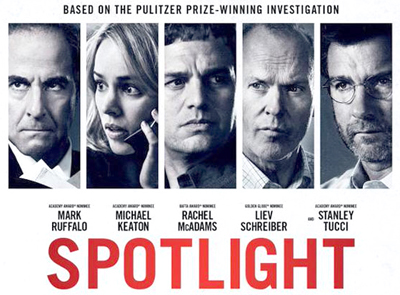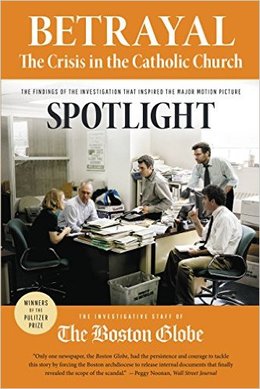|
SPOTLIGHT (2015) Directed by Tom McCarthy. Written by Josh Singer & Tom McCarthy. Featuring Michael Keaton, Mark Ruffalo, Rachel McAdams, Live Schreiber, John Slattery, Stanley Tucci, Brian D’arcy James. I was involved in a Facebook wall chat recently with the science fiction writer and Blue Oyster Cult lyricist John Shirley, in which he was decrying conspiracy theorists and their psychological problems, etc., the usual sort of thing. I responded by posting links to (1) a government report on MK-ULTRA; (2) a link to the Tuskegee syphilis experiment; (3) a link to the transcript of Richard Nixon remarking how he could get the money to pay off E. Howard Hunt; and (4) a link to an article about how at least seven banks conspired with Enron during that particular scandal. Mr. Shirley helpfully explained that none of these were “real” conspiracies, and that Watergate was a “tiny little conspiratorial thing.” Oh. Unfortunately, it is no longer tenable to assert that there are not large-scale conspiracies afoot in the world of business, government, law, and – as shown in the new film Spotlight – the Catholic Church. To argue otherwise is to both give moral support to those who would collude for the purposes of power and to submit to another’s arbitrary authority. This particular film, directed by Tom McCarthy and based on the Boston Globe’s extensive investigation into pedophilic priests, is one of the most important of its kind ever made. One of the reasons it’s so good is because it proceeds – as a real investigation should – from a series of small details that lead to a larger context, which in this case implicates the Vatican itself. The movie gives us the members of the Spotlight team, led by Walter Robinson (Keaton, beautifully understated), Mike Rezendes (Ruffalo), Sasha Pfieffer (MacAdams), and Matt Carroll (James), a group within the Globe whose job it is to perform long-term investigations. When the venerable newspaper hires its first Jewish editor, Marty Baron (Schreiber), he decides the first order of business is to pursue the local story of a priest accused of molesting young boys. This does not make the established order of Boston very happy. As the film explains, the Irish cops don’t like to make the (clerical) collar; the judges don’t want to make them testify; and the people don’t like the threat to their own sense of community. Nobody wants to put God on trial. What makes the film special is that it doesn’t stop at the first priest, or even the tenth. In a scene that makes up the core of the picture, Marty Baron says the story is the “system.” That is, the problem is systemic and they have the story only when they can indict the entire underlying structure that protects these pedophiles. And that particular angle does go all the way to the top – to the highest members of the clergy, and ultimately to the Vatican, which maneuvers these men from one parish to another, leaving a trail of victims. How did they hide the crimes? Through cash settlements. As depicted in Spotlight, the Holy Church used lawyers to arrange the payoffs. The book Betrayal: The Crisis in the Catholic Church, by the investigative staff of the Boston Globe, goes into more detail: “In fact virtually all those who went to the Church with claims of sexual misconduct by priests received settlements before they filed suit, an arrangement that left no public record of the crime committed by the abusing priests.” (51) One thing that struck me in both seeing the picture and reading the account afterward in Betrayal, is that at the beginning of the investigation the reporters were all in the position of conspiracy theorists. The more they probed the story, the more they had information implicating one of the most powerful and oldest institutions in the world in horrible crimes. They learned of networks, of backroom deals and of forces capable of altering court documents and destroying unwanted information. One of the fears in the movie, expressed by the Baron character, is that the Church would want to apologize and investigate its own messes. This is, in fact, exactly what it tried to do in the wake of the Globe’s reporting. After the initial Globe reports, the cardinal held a televised press conference at which he apologized for his past mistakes and promised to report any future allegations against priests to the authorities… “He was basically saying, ‘Trust us, give us the benefit of the doubt, we’ll create a commission to make sure this doesn’t happen again.’ Well, we tried that. It didn’t work.” (135) The Church created ‘treatment facilities’ in which they would ship repeat offenders, but it turned out those facilities made essentially no real attempt to block access from the priests to the kids. So naturally the priests would repeat again.
We know, in fact, that no institution can police itself honestly that way. As we have seen over and over again with police departments, the CIA, and other governmental investigations, the mantra “we have investigated ourselves and found nothing wrong,” is a recipe for corruption. It proved true in the Warren Commission, which came to an absurd conclusion in the Kennedy assassination, and it has failed again and again to find evidence of high crimes in public scandals. “No institution can police itself,” said David Clohessy, national director of the Survivors Network of those Abused by Priests. “If the Church wants to restore trust, leaders should be more open about these treatment facilities. If chemical companies said, ‘Just trust us – send us your dioxins; we’ll clean them up,’ – the public would be wary.” (176) By dealing with its subject honestly and at least making an effort to expose the incredible scope of the Catholic Church’s abuse scandal, Spotlight deserves immense credit. An absorbing, fascinating film, sharply made and efficient, it packs a punch. It earns its comparisons to All the President’s Men, and if it isn’t quite as slickly made, it has the benefit that the story it tells isn’t a fairy tale designed to protect the CIA but a true indictment of established power. After all, what entity owns more land than the Vatican? Why does the Pope have a Swiss guard? Why are priests made to be celibate? It has nothing to do with morality - it was to prevent priests from having heirs who might fight for property rights. The more one scratches the surface of the Holy Mother Church, the more one finds a den of thieves who have turned the musings of a carpenter's son into a golden empire. If this film helps get people to look at that, then it has truly done the Lord's work.
0 Comments
Your comment will be posted after it is approved.
Leave a Reply. |
AuthorThis is Joe Green's blog. Archives
August 2021
Categories |


 RSS Feed
RSS Feed
